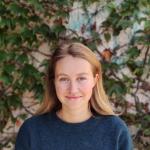Originally from Norway, you pursued a Bachelor’s degree in International Relations and Economics at the University of Birmingham before coming to the Geneva Graduate Institute for your postgraduate studies. What brought you to study at the Institute?
During my Bachelor’s studies, I kept coming across books and articles written by Graduate Institute researchers, including some PhD dissertations that had been turned into books. Many of these were important for shaping my thoughts on and interest in international politics and issues of global governance. When finishing my Bachelor’s degree, I was looking for a study program that offered both deep theoretical engagement and opportunities to interact with practitioners, and the Graduate Institute does both. When you add the fact that the Institute is located in the midst of key global governance actors and fabulous mountains, the choice was a rather easy one.
In your doctoral research, you are investigating the politics of attributing disasters such as floods and fires to climate change. What is your main research puzzle and how do you expect to contribute to current debates?
There has long been widespread agreement in the natural sciences that the impacts of anthropogenic heating are unfolding – that ice caps are melting, storms are more frequent and intense, and the sea level is rising. In recent years, there has been growing political acknowledgement of this, which we especially see in the aftermath of disaster events. I am interested in the political effects of this. On the one hand, there is an expectation that making this link temporally relocates climate change from the future to the present, thereby mobilizing support for more ambitious climate policies. On the other hand, there is a strong tradition in disaster studies that highlights the social, political, and economic aspects of disasters, the idea being that there is no such thing as a “natural” disaster. In this vein, there are worries that blaming disasters on climate change is a way of absolving authorities of their responsibilities. In my doctoral research, I seek to intervene in these debates by empirically exploring (1) the different causal claims made during and after disasters, and (2) the effects these have on community configurations, priorities, and policies.
In September 2022, you were hired as a research assistant for a four-year Swiss National Science Foundation (SNSF) project led by Annabelle Littoz-Monnet that investigates how expertise is produced and stabilized in global governance. What is your main role in this project?
We are currently in the starting phase of the project, which means that we are planning the next four years and defining the different aspects of the project. Specifically for me, this involves looking into which conferences and workshops might be relevant to attend, thinking about ideas for papers that can be part of the project outputs, and setting up a project website. I am also assisting Professor Littoz-Monnet with articles that she is writing within the scope of the project. This includes conducting and transcribing interviews and browsing relevant scholarly literature. Finally, I am looking into some of the methods we plan on using, specifically qualitative/visual network analysis, and I get to attend a workshop to learn the technical aspects of this method.
To what extent does the theoretical, methodological, and empirical focus of the project overlap with some of your more general research interests?
I have a strong interest in the politics of knowledge and expertise. In my empirical field, climate politics, scientists and experts have played and continue to play a central role in defining and delineating problems, shaping agendas, and formulating solutions. The interplay between scientists and political decision-makers, processes of data construction and circulation, as well as the role of infrastructures, are fascinating, and Professor Littoz-Monnet’s project goes to the heart of these issues by highlighting the production and stabilization of expert knowledge. In my doctoral research, I pay particular attention to causal claims and narratives, which can in part be unpacked in connection to the production and circulation of expert knowledge. Despite my project not focusing exclusively on experts and expertise, I draw on similar theoretical perspectives on the nature and role of knowledge. In addition, the project employs many of the same methods as I do in my doctoral research, including text analysis and semi-structured interviews.



